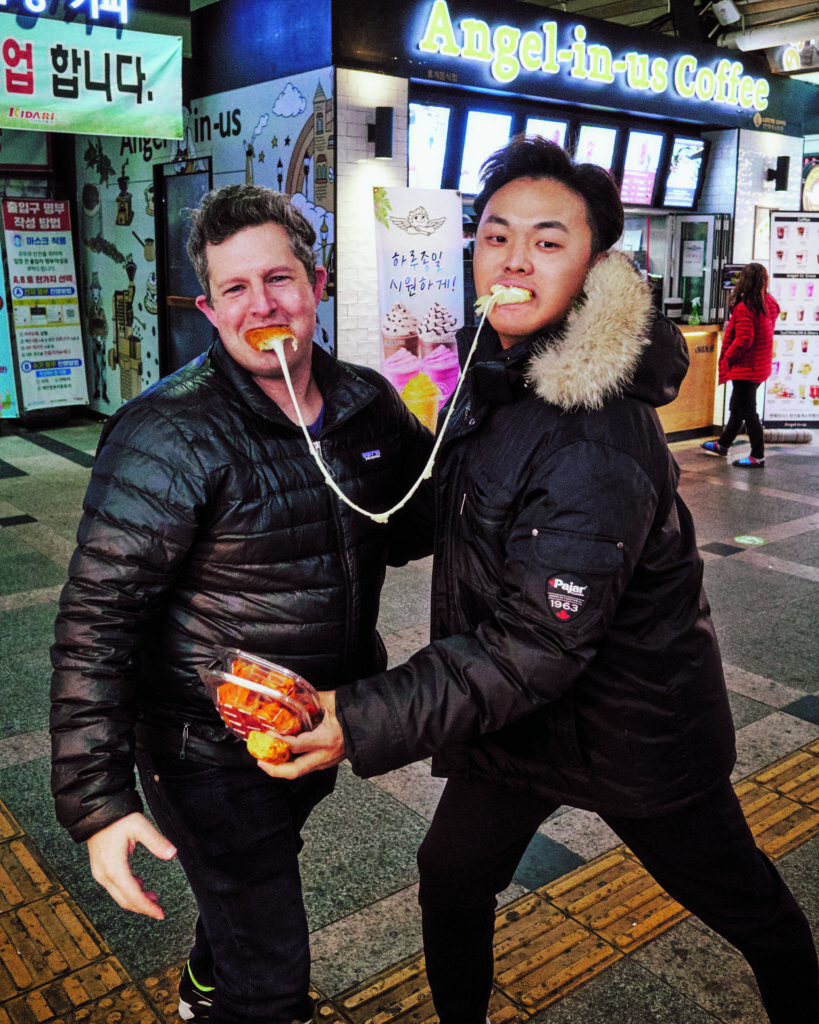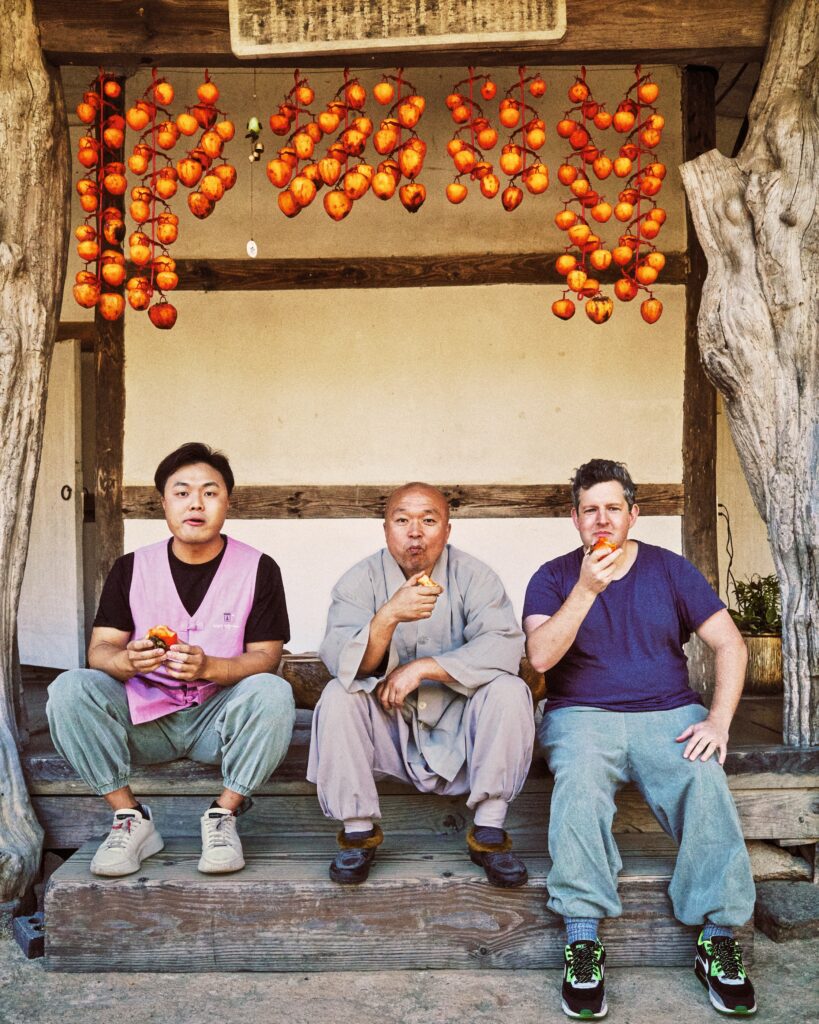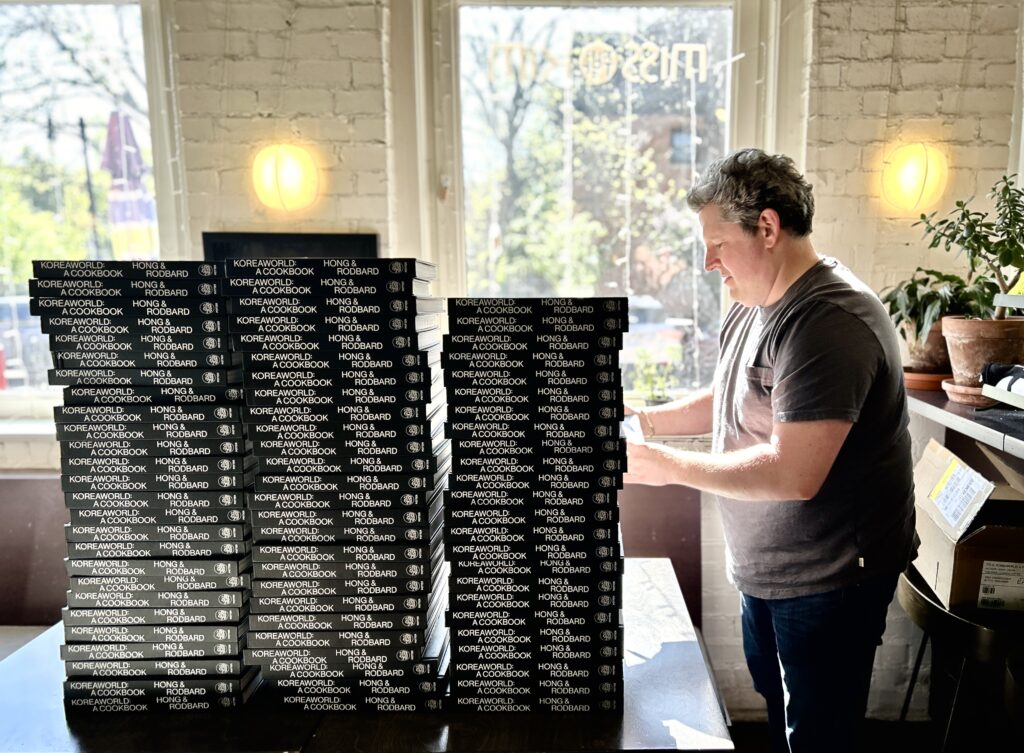By Jia H. Jung, California Local News Fellow
Revelers packed the Asian Art Museum in San Francisco on Friday to savor Korean-inspired bites from Volcano Kimchi, Outta Sight Pizza, and The Korner Store, tea drinks from Narra, and brews from Dokkabier. They were there to celebrate Chef Deuki Hong and TASTE editor-in-chief Matt Rodbard as they discussed the evolution and future of Korean cuisine.
Hong and Rodbard are co-authors of the new Koreaworld: A Cookbook, released on April 23 by Clarkson Potter publishers. The San Francisco launch event at the museum is one of the biggest stops on their world tour, which began in New York City. Their special guest in San Francisco was Andrea Nguyen, author of Ever-Green Vietnamese cookbook featuring plant-based recipes.
On stage, Nguyen, a veteran cookbook writer, spoke to the increasing curiosity in the U.S. toward all Asian cuisines. She said that she could tell Americans were coming around to authentic Asian flavors because they “are more willing to taste fish sauce off a spoon than by dipping a slice of cucumber in it,” and want recipes to be accessible but not dumbed down. She also observed that the healthiness and sustainability inherent to many Asian cuisines have an appeal that transcends all backgrounds.
Hong and Rodbard are confident that Korean food is a part of this greater phenomenon and will live on not just through one celebrity chef, Koreatown, or restaurant, but through a growing prism of interpretations around the world.

The duo met over a decade ago in 2013, when they were both judges rating 65 Korean restaurants in New York for a guidebook sponsored by the South Korean government’s overseas food promotion campaign.
Hong was a newly minted chef at the time. Born in Korea and raised in New Jersey, he famously got his start in the culinary world at just 15 years of age before entering the Culinary Institute of America and having an externship at Momofuku with lately notorious chef and entrepreneur David Chang. From there, he went straight into the prestigious French kitchen of Jean-Georges in New York City.
“I was like, he’s a young chef, he’s really impressive, he really has his stuff together, came with meticulous notes and was really taking the assignments seriously. And I was like, wow, that’s the guy I really want to get to know,” recalled Rodbard to AsAmNews while in Ann Arbor, Michigan for a special event at Chef Ji Hye Kim’s restaurant Miss Kim with special guest Eric Kim, New York Times food writer and author of Korean American: Food That Tastes Like Home. Hong, meanwhile, was representing the book at a sold-out event down in Miami, Florida.

The two befriended one another by going out to eat a lot and discussing the changes they were seeing in the Korean culinary landscape.
By age 25, Hong had left Jean-Georges to become the head chef at Manhattan Koreatown’s Kang Ho Dong Baekjeong, the Korean BBQ chain founded by comedian and former wrestler Kang Ho-dong that opened in December 2014.
Rodbard contacted him about maybe writing a book about some of the themes they’d discussed.
The result was Koreatown, published Feb. 16, 2016. The cookbook explored and shared recipes from the Korean American communities across the country. Though conceptualized years beforehand, the book arrived right after Psy’s earworm Gangnam Style kicked open the gates of American mainstream culture to the worldwide “Hallyu wave” of Korean popular cultural products. Thanks to timing and quality, the book became a New York Times bestseller.
Rodbard reached out to Hong about another project just as the chef was regaining his footing after moving to San Francisco and weathering the pandemic. Together, they made numerous trips to various points in South Korea in the fall of 2021 and 2022.

They got to know the elderly owners of dying traditional food stands in the Euljiro area. They gained rare access to a sixth-century Korean Buddhist monastery to witness the everyday preparation of food authentically devoid of animal products or osinchae quintet – onions, garlic, scallions, chives, and leeks – thought to obstruct spiritual practice. They captured the innovations happening in Korea’s culinary scene by spending time with Korea’s Michelin-star holding Mingoo Kang, talking with the creator of YouTube food account Doobydobap, and observing Korean consumers in their element.
They also took time to explore beyond Seoul. They paid tribute to the history of democratic struggle in Gwangju, a southwestern city of the province of Jeollanamdo famous for its food and traveled to Jeju island south of the peninsula to understand its unique culture and cuisine.
Koreaworld also touched back on Korean communities in the U.S., highlighting the stories, work, and preferences of figures such as sober Korean American chef Jae Lee of the Nowon pocha bar and restaurant in the East Village of New York City, Ted and Yong Kim of Seoul Sausage Company, Danny and Yesoon Lee of Northern Virginia’s and Washington D.C.’s Koreatowns, Eddo Kim and Clara Lee, who run an online superette called Queens out of California’s Bay Area, Korean adoptee chef Kate Telfeyan, Black and Puerto Rican Chef Angel Barretto who was born to military parents who met in Korea, and a 10-year-old Korean American girl.
The result is a deep, philosophical work of food, travel, and cultural journalism, richly photographed by Alex Lau. As a cookbook, Koreaworld delivers a fresh trove of rigorously tested recipes that are traditionally vetted and future-looking at the same time, daring anyone who can follow instructions to try making samgyetang tongdak whole roasted chicken stuffed with rice and ginseng as a take on a traditional healthful stew, bibimbap as tasted on Korean Air flights, yangpa kimchi made of whole onions, temple dubu jorim marinated tofu, Northern Virginia dakjuk chicken porridge, Jeju island style whole-fried smashed rockfish, and cocktails repping Korea’s third wave coffee culture with espresso and orange juice.
Guest chefs also gave some secrets to the book. Peter Cho of Han Oak in Portland, Oregon contributed Bottom-Of-The-Pot Butter Juk, a way to make porridge out of the dredges of leftover Korean stew. Ji Hye Kim of Miss Kim in Ann Arbor, Michigan added a recipe for a drinkably dank kkaenip pesto made of perilla leaves, a concoction informed by her adoration for the emblematically Korean leaf and her time training in Italy. Hong himself added a salt-cured egg to elevate yukhwe, the marinated beef tartar of Korea.

The recipes also include traditional grace notes like how to make tiny, candied anchovies popular in Korea as side dishes or as ingredients in kimbap rolls, and how to wash and cook rice – never as obvious a process as it seems.
In San Francisco, Hong told the audience, “Our mission was more of a love letter. Being Korean American, I didn’t grow up in Korea. And, spoiler alert, Matty isn’t Korean.” The audience laughed with the panel members, who assured one another in all seriousness that neither Hong nor Rodbard were tokens in their relationship.
“I get to be a conduit when most people don’t. There are better storytellers, better chefs. I just think I’m uniquely positioned and there’s a lot of gratitude there,” Hong said prior to the release of Koreaworld from the loft overlooking the bustling, fragrant production room of Neighbor Bakehouse in San Francisco.
He insisted that Rodbard was the true driving force behind both Koreatown and Koreaworld. “It was him reaching out to me, him conceptualizing it, and that’s not even just giving credit, it’s just fact,” he said.
Rodbard, born and raised in Michigan, is always aware of the question about who gets to tells the story of Korean cuisine. He said that Korean food is the “culinary revolution of our generation” – a force so big and changing so fast that he and Hong neither expect nor want to be the only voices recording these epic moments of transformation happening at lightspeed.
“I think that the best way to approach Korean food is to be as specific as possible, and have as many people writing about it as possible. Instead of having one journalist who has to say everything about everything because then it’s really diluted, and it’s whitewashed, and it just doesn’t serve anyone,” he said, in a private conversation in Ann Arbor.
When asked at back at his bakeshop who he wants Koreaworld‘s audiences to be, Hong said bluntly, “Anyone who will listen. What platform? Anywhere.”
He said that, for being second-time authors, he and Rodbard never sat around calculating how to sell copies – it’s a long shot for any cookbook to make the big bucks anyway. What they did was document what struck them as important and interesting, tell the stories that had yet to be told, and let the rest follow.

What Hong and Rodbard know from their book’s reception so far is that the audience for Korean food is indeed growing with no signs of slowdown. Many more pockets of Korean culinary game changers have almost certainly been there all along and have yet to be found. And wherever they are, the new epicenters of Korean food are moving far beyond the Koreatowns in Los Angeles and New York.
After San Francisco, the authors will continue on to Portland, Oregon (May 12 at Powell’s City of Books and May 13 at Jeju Restaurant), Seattle, Washington (May 14 at the Book Larder community cookbook store), Denver, Colorado (May 28 at Hong’s Hey Kiddo restaurant) Dallas, Texas (May 30 at Pochakaya, a Korean pocha and Japanese izakaya concept restaurant in Carrollton), Napa California (June 21 and 22 at Cookbook Fest), and Atlanta (June 25 at Chai Pani Decatur with Meherwan Irani).
Yet-to-be-determined launch locations include Phoenix, Philadelphia, Minneapolis, Chicago, Madison, Charleston, Berlin, London, and Seoul – everywhere that Korean food has stalwart and emerging devotees.
Hong said he hopes one of their recipes can be a dinner option for an everyday American family in Kansas.
Though they acknowledge the synergy of K-pop and K-dramas in also hyping K-food around the world, Hong and Rodbard don’t think that Korean cuisine is just a trend that will die out. But maybe someday, instead of being called a Korean restaurant, a Korean restaurant will just be referred to as a really great restaurant – no longer a perpetual foreigner among its peers.
AsAmNews is published by the non-profit, Asian American Media Inc.
We are currently funded by our readers and such charitable foundations as the Robert Wood Johnson Foundation, AARP, Report for America/GroundTruth Project & Koo and Patricia Yuen of the Yuen Foundation.’
Find additional content on Bluesky, Facebook, Instagram , Tiktok, X, and YouTube. Please consider interning, joining our staff, or submitting a story, or making a tax-deductible donation.
You can make your tax-deductible donations here via credit card, debit card, Apple Pay, Google Pay, PayPal and Venmo. Stock donations and donations via DAFs are also welcomed. Contact us at info @ asamnews dot com for more info.



